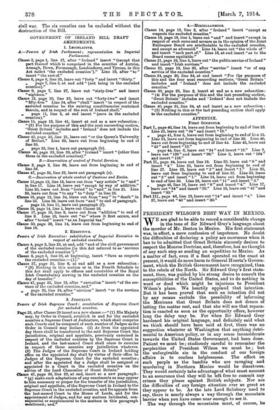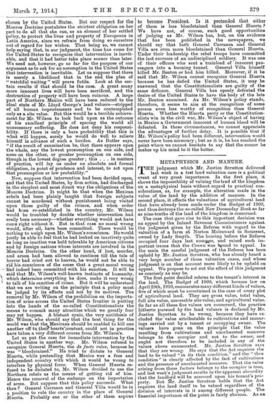PRESIDENT WILSON'S BEST WAY IN MEXICO.
WE are glad to be able to record a considerable change in the tone of Sir Edward Grey's language about the murder of Mr. Benton in Mexico. His first statement was, in effect, a mere confession of impotence. No doubt the difficulties of declaring a policy are enormous when it has to be admitted that Great Britain sincerely desires to respect the Monroe Doctrine, and, therefore, has no thought of any such step as sending an expedition to Mexico. As a matter of fact, even if a fleet operated on the coast at present, it would do more harm to General Huerta's Govern- ment, which the British Government have recognized, than to the rebels of the North. Sir Edward Grey's first state- ment, then, was guided by his strong desire to consult the susceptibilities of the United States, and to do nothing in word or deed which might be injurious to President Wilson's plans. We heartily applaud that intention. But it has been proved that such an intention did not by any means exclude the possibility of informing the Mexicans that Great Britain does not dream of letting the matter rest, and that she will see that repara- tion is exacted as soon as the opportunity offers, however long the delay may be. For when Sir Edward Grey hardened his original language, and definitely said what we think should have been said at first, there was no suggestion whatever at Washington that anything detri- mental to American policy, or in any sense inconsiderate towards the United States Government, had been done. Patient we must be ; studiously careful to remember the perplexities of President Wilson we must be ; but the unforgivable sin in the conduct of our foreign affairs is to confess helplessness. The effect on such people as the bandits who are ravaging and murdering in Northern Mexico would be disastrous. They would certainly take advantage of what must amount to an assurance that they will be left free to commit any crimes they please against British subjects. Nor are the difficulties of any foreign situation ever so great as they appear to be. As the late Lord Salisbury used to say, there is nearly always a way through the mountain barrier when you have come near enough to see it. The way through the mountains must, of course, be chosen by the United States. But our respect for the Monroe Doctrine postulates the strictest obligation on her part to do all that she can, as an element of her settled policy, to protect the lives and property of Europeans in Latin America, since we refrain from doing so ourselves out of regard for her wishes. That being so, we cannot help saying that, in our judgment, the time has come for the United States to recognize that intervention is inevit- able, and that it had better take place sooner than later. We need not, however, go so far for the purpose of our argument as to ask for an assumption in the United States that intervention is inevitable. Let us suppose that there is merely a likelihood that in the end the plan of "watchful waiting" will prove futile. Look at the cer- tain results if that should be the case. A great many more innocent lives will have been sacrificed, and the destruction of property will have been ruinous. A large part of Northern Mexico will have been reduced to the ideal state of Mr. Lloyd George's land valuers—stripped of all human improvements and to be contemplated only as a site value. But this would be a terrible achieve- ment for Mr. Wilson to look back upon as the outcome of his excellent principle of sparing the world all unnecessary suffering. He does not deny his responsi- bility. If there is only a bars probability that this is what will happen, surely he would do well to relieve himself in advance of such a burden. As Butler says, "if the result of examination be, that there appears upon the whole, any the lowest presumption on one side, and none on the other, or greater presumption on one side, though in the lowest degree greater ; this . . . in matters of practice, will lay us under an absolute and formal obligation, in point of prudence and interest, to act upon that presumption or low probability."
Now, suppose that intervention had been decided upon, and that the United States, by firm action, had discharged in the simplest and most direct way the obligations of the Monroe Doctrine. It might be that when the Mexican rebels had been plainly taught that foreign subjects cannot be murdered without punishment being visited upon those guilty of the crimes, and when order had ben re-established in the country, Mr. Wilson would be troubled by doubts whether intervention had really been necessary—whether everything would not have come right without it. But in that case no moral wrong would, after all, have been committed. There would be nothing to weigh upon Mr. Wilson's conscience. He would justly be able to feel that he had looked on inactively quite as long as inaction was held tolerable by American citizens and by foreign nations whose interests are involved in the Monroe Doctrine. On the other hand, if loot, murder, and arson had been allowed to continue till the tale of horror had cried out to heaven, he would not be able to rid his conscience of the sense that a great moral wrong -'lied indeed been committed with his sanction. It will be said that Mr. Wilson's well-known instincts of humanity, which determine everything he does, make it very wrong to talk of his sanction of crime. But it will be understood that we are writing on the principle that a policy must be judged by its effects and not by its motives. The removal by Mr. Wilson of the prohibition on the importa- tion of arms across the United. States frontier is putting into the hands of the so-called Constitutionalists the means to commit many atrocities which we greatly fear may yet happen. A blatant cynic, the very antithesis of Mr. Wilson, who should say that the best thing for the world was that the Mexicans should be enabled to kill one another off to, theithearts'lcontent, could not in practice have taken a very different course from Mr. Wilson's.
Let us put the case for immediate intervention by the United States in another way. Mr. Wilson refused to recognize General Huerta, the de facto ruler, because he was " bloodstained." He tried to dictate to General Huerta, while pretending that Mexico was a free and independent country with which it would be wrong to interfere by physical force. When General Huerta re- fused to be dictated to, Mr. Wilson decided to use the Northern rebels as the means of getting rid of him. Hence the removal of the embargo on the importation of arms. But suppose that this policy succeeds. What then ? General Carmnza and General Villa would be in a position to rule the country in the place of General Huerta. Probably one or the other of them aspires to become President. Is it pretended that either of them is less bloodstained than General Huerta ? We have not, of course, such good opportunities of judging as Mr. Wilson has, but, on the evidence that has been published in the newspapers, we should say that both General Carman, and General Villa are even more bloodstained than General Huerta. Under their leadership the rebel troops have committed the last excesses of an undisciplined soldiery. It was one of their officers who sent a trainload of innocent pas- sengers into a burning tunnel. General Villa himself killed Mr. Benton or had him killed. Moreover, if it be said that Mr. Wilson cannot recognize General Huerta because he has defied the United States, it may be answered that the Constitutionalists are guilty of the same defiance. General Villa has openly defeated the desire of the United States to have the body of the late Mr. Benton examined. As Mr. Wilson's policy stands, therefore, it seems to aim at the recognition of some person even less worthy of recognition than General Huerta. Whether the Huerta party or the Constitution- allots win in the civil war, Mr. Wilson's object of having in Mexico a Government innocent of human blood will be defeated. In these circumstances, we cannot appreciate the advantages of further delay. It is possible that if Mr. Wilson's policy had been different, intervention would never have been necessary ; but as it is, he has reached the point where we cannot hesitate to say that the sooner he makes up his mind to it the better.















































 Previous page
Previous page